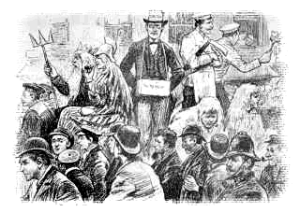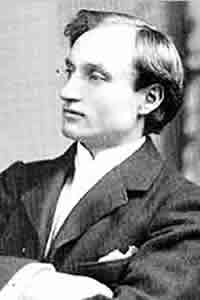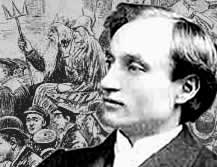Description
 See the London dock workers dressed as figures from classical mythology in a carnivalesque procession during their strike of 1889. The image is one from a collage published on the front cover of the Illustrated London news for 7th September. Two dockers are dressed as Neptune and a helmeted warrior goddess, probably Britannia; on the right one of the seated figures may be Hercules, a hero with whom dock workers, as sellers of their own muscle power, often identified.
See the London dock workers dressed as figures from classical mythology in a carnivalesque procession during their strike of 1889. The image is one from a collage published on the front cover of the Illustrated London news for 7th September. Two dockers are dressed as Neptune and a helmeted warrior goddess, probably Britannia; on the right one of the seated figures may be Hercules, a hero with whom dock workers, as sellers of their own muscle power, often identified.
The immediate cause of the strike was a cut in the bonus or ‘plus money’ awarded to dock workers for fast completion of tasks in the West India docks. But their fundamental situation was so iniquitous that the strike spread like wildfire. The main problem was the irregularity of the work, which was dependent on how many ships came in. Twice a day the employers held a humiliating ‘call-on’, when they picked workers for just a few hours out of the crowds of men desperate for work. The leader of the strikers, Ben Tillett, described the process:
 “We are driven into a shed, iron-barred from end to end, outside of which a foreman or contractor walks up and down with the air of a dealer in a cattle market, picking and choosing from a crowd of men, who, in their eagerness to obtain employment, trample each other under foot, and where like beasts they fight for the chances of a day’s work.”
“We are driven into a shed, iron-barred from end to end, outside of which a foreman or contractor walks up and down with the air of a dealer in a cattle market, picking and choosing from a crowd of men, who, in their eagerness to obtain employment, trample each other under foot, and where like beasts they fight for the chances of a day’s work.”
The strikers were joined by the Stevedores and received financial aid to buy their families food from dock workers in Australia. The generally peaceful and festive nature of the public processions did much to engage public support. The meeting convened by London’s Lord Mayor to hear both sides, the Mansion House Committee, resulted in several concessions in favour of the strikers, although they did not achieve the minimum wage of sixpence an hour they had wanted. They agreed to return to work on September 16th.




